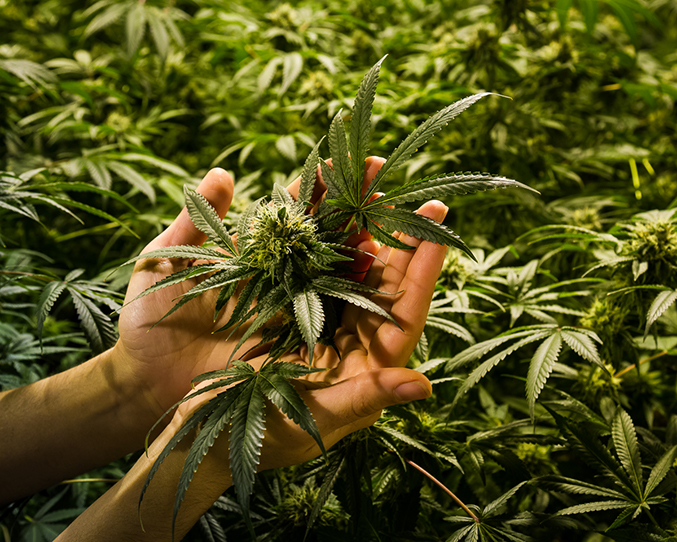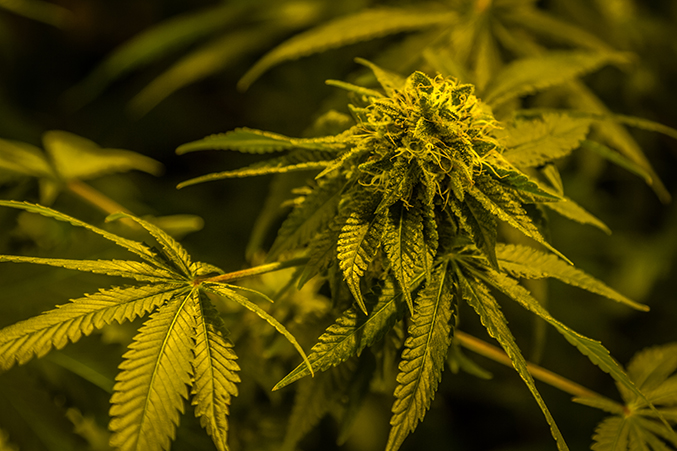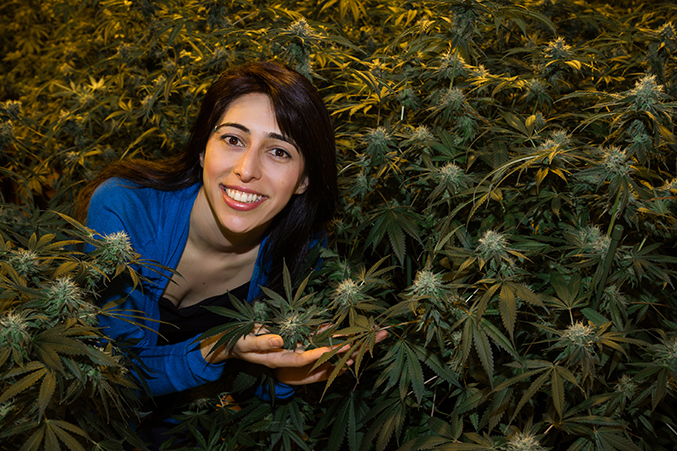Salimeh Tabrizi Harvest by MaryBeth Lafferty / Cosmic Sister
One day while Salimeh Tabrizi, M.Ed., was meditating, the cannabis plant came to her in a vision as an infuriated goddess of compassion. “She was tired of being abused, misused, misunderstood, and prostituted,” Tabrizi says. “She demanded respect.”
Tabrizi was called to action. She created the Cannabis Hemp Conference and Expo (CHCE), one of Canada's largest and only women-run cannabis conferences with 50 presenters and more than 900 attendees. The fourth annual conference will be held May 6 and 7, 2017, at The Nest, the University of British Columbia’s beautiful new LEED Platinum-certified building. An important conference goal, Tabrizi says, is “giving thanks to cannabis for all that she gives.”
A diverse group of experts—including doctors, researchers, biologists, authors, artists, naturopaths, growers, activists, historians, entrepreneurs, and dispensary owners—will discuss growing cannabis outdoors without toxic chemicals and “being mindful, respectful, non-abusive or addictive,” Tabrizi says. Workshops will cover everything from cannabis and health to cooking and juicing to organic growing methods. Master holistic growers Susan Sheldon, David Bernard-Perron and Travis Lane will offer hands-on garden wisdom, and musician John Sheldon (Susan’s husband) will provide cannabis-inspired ceremonial music. Every individual who steps into “the container of the conference” helps co-create a gathering about community and working together, Tabrizi says.
“Ultimately,” she adds, “it’s about self-empowerment and leading with your heart for the plants.”
Tabrizi is disgusted that cannabis has been “degraded, prostituted, villainized, stigmatized, and imprisoned—grown indoors without natural light and air.” She’ll never forget visiting a Canadian grower who looked over a prize plant and said, “I want to see how much this bitch can get me.”
“That,” she says, “is abusive.”

“These plant medicines ultimately want to help and support us in connecting to our higher selves.” - Salimeh Tabrizi
Photo by MaryBeth Lafferty
Cannabis and Ayahuasca, Plant Medicine Teachers
Tabrizi immigrated to Canada from Iran when she was nine. She earned a master’s degree in education in counseling psychology from the University of British Columbia but practiced counseling for only a year. A seasoned ayahuasca journeyer, she got a message during ceremony in the Peruvian Amazon that she should step into an integration counsellor role, helping people integrate their ayahuasca experiences into their day-to-day lives. For the past four years, she has assisted during ayahuasca ceremonies and post-ceremony integration, sharing grounding tools with people whose lives may have been turned upside down after drinking ayahuasca.
“Madre (Mama Ayahuasca) told me that her medicine was being wasted because people were drinking, then drinking, then drinking again and not doing the integration work when they returned home,” Tabrizi says. “These plant medicines ultimately want to help and support us in connecting to our higher selves. Using ayahuasca or cannabis—or any plant medicine—as a crutch is not a way to empowerment.”
Ayahuasca and cannabis have been important teachers for Tabrizi. When she began communing with cannabis, it amplified her anxiety, and her mind raced. “She would kick my ass!” Tabrizi says. She spent years learning to calm down and slow down so she could be at peace with cannabis.
“I had so much fear around cannabis from prohibition propaganda that I didn’t try it until my first year at university, and I actually hallucinated,” she says. “My focus and intention and willingness to work allowed me to clear away the fear and welcome in empowerment.”
Cannabis as the Goddess of Compassion
Tabrizi’s plant medicines have taught her big lessons about being a spiritual female within the male corporate realm. She often sees cannabis in visions as the goddess of compassion, generous but asserting her boundaries.
“Cannabis is saying, ‘Enough is enough, guys!’” Tabrizi says. “No more pushing things under the rug, no more sweeping things behind the door, no more polite pretending. Instead, we’re learning to speak the truth from our hearts without being aggressive or hostile.”
Tabrizi believes the plants have an agenda; they want all of nature—including humans—to live together in balance. She once had a vision in which ayahuasca vines grew up from the ground and wrapped up and around her body to her throat, where they became a snake that said, “I own you.” Tabrizi stood up to her. “No, you don’t,” she said. “We are co-creating together.” The vines let go and burst into flowers. The snake came back and said, “Just checking.”
Intrigued by “the plant spirit sisterhood of ayahuasca and cannabis,” Tabrizi sees the cannabis liberation movement and the ayahuasca Amazon liberation movement as connected. The plants are reaching out for help. “If we don’t go back to our heart and the heart of our planet, we’re going to perish,” she says. “The social, humanitarian and environmental causes must be at the forefront of the conversation and then back to our personal journeys, but this is now a collective re-evolution of humans.”
“Centuries of Eastern healers have accepted and explained over and over again that we are nature and that nature teaches us about balance and joy and well-being,” Tabrizi says.

“No more pushing things under the rug, no more sweeping things behind the door, no more polite pretending. Instead, we’re learning to speak the truth from our hearts without being aggressive or hostile.” - Salimeh Tabrizi
Photo by MaryBeth Lafferty
Humans’ mistreatment of cannabis is a strong statement about where we are as a species, she adds. “The faster cannabis is free to come out of the darkness and into the light, the faster we, too, can reconnect with nature and reach for the sunlight, breathe in again, and let our roots grow deeper, reaching out to others.”
The Cannabis and Hemp Conference moves that agenda forward while fostering committed community with an impressive roster of inspired presenters. Including the keynote speakers, bestselling author Graham Hancock, hemp activist Anndrea Hermann, ethnobotanist and medicine hunter Chris Kilham, and neurologist and leading cannabis researcher Dr. Ethan Russo. Dr. Natasha Ryz, PhD, will discuss cannabis for gut health and skin care. Jodie Emery, who along with her husband, Marc, was recently arrested and stripped of her businesses, Cannabis Culture stores and vapor lounges and a TV service, will give a report.
“This is a very confusing time in the fight to liberate cannabis in Canada,” Tabrizi says. Officials made an example of the Emerys, who ran illegal but generally tolerated dispensaries across the country, before adult use becomes legal in Canada in 2018, she adds. “Their paradigm is breaking, and the government is just clutching at straws. I tell Jodi—who is Canada’s cannabis sweetheart—to stay strong because this sort of behavior only strengthens our case.”
About Zoe Helene
Psychedelic Feminist Zoe Helene (@CosmicSister) is a multidisciplinary artist, cultural activist and journeyer who is connecting visionaries and activists who share her commitment to the rights of women, wilderness and wildlife and to the liberation of “sacred plants” such as cannabis, which she promotes as allies for ethical evolution. She has been featured in top tier media venues such as Forbes, Bust, Outside Magazine, Boston Magazine, LA Yoga, Vice/Broadly, Utne Reader and many more.
About MaryBeth Lafferty
Photos by Cosmic Sisters of Cannabis award-winner MaryBeth Lafferty, a Vancouver, Canada-based photographer in the cannabis liberation movement.




